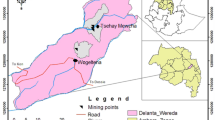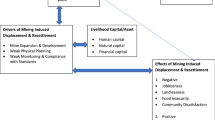Abstract
The termination of mining activities resulting from the exhaustion of mineral resources usually kills the local economies of mining communities and ultimately impoverish the inhabitants of the affected communities. Underpinned by this, sustainable livelihoods in artisanal small-scale mining communities have assumed prominence in international and national discourses. This study thus explores ways of sustaining livelihoods in the artisanal small-scale mining communities within the Tarkwa-Nsuaem Municipality of Ghana. Using primary data from a sample of 400 household heads, 19 institutions, six artisanal and small-scale mining firms, and two mineral processing companies, the study finds the mining chain, from extraction through processing to sale, as a major source of livelihood to the labor force of the mining communities. However, the sustainability of small-scale mining is threatened by lack of skills development programs and the creation of opportunities for continued education with the objective of building the human capital base of the artisanal and small-scale mining communities. One way of increasing such opportunities is by introducing diversification through modernized agriculture.

Similar content being viewed by others
References
Aidt, T. S. (2010). Corruption and sustainable development (No. CWPE 1061). Cambridge. Retrieved from https://www.repository.cam.ac.uk/bitstream/handle/1810/242086/cwpe1061.pdf;jsessionid=33A12327621029A0EF0B686DD27C5E5C?sequence=1.
Akabzaa, T., & Darimani, A. (2001). Impact of mining sector investment in Ghana: a study of the tarkwa mining region. Retrieved from http://www.saprin.org/ghana/research/gha_mining.pdf.
Akabzaa, T., Seyire, J. S., & Afriyie, K. (2007). The glittering facade: effects of mining activities on obuasi and its surrounding communities. Accra: Third World Network- Africa (TWN – Africa).
Ashley, C., & Carney, D. (1999). Sustainable livelihoods: lessons from early experience. Development. Nottingham. Retrieved from http://www.librarything.com/wiki/images/a/aa/Ashley_Sustainable_livelihood_lessons_learned.pdf.
Awudi, G. B. K. (2002). The role of Foreign Direct Investment (FDI) in the mining sector of Ghana and the environment. In OECD Global Forum on Foreign Direct Investment and Environment. Paris, France.: OECD Publishing.
Baah-Ennumh, T.Y., & Forson, J. A. (2017). The Impact of Artisanal Small-Scale Mining on Sustainable Livelihoods: A Case Study of Mining Communities in the Tarkwa-Nsuaem Municipality of Ghana. World Journal of Entrepreneurship, Management and Sustainable Development, 13(3). doi:10.1108/WJEMSD-09-2016-0042.
Bass, S., & Dalal-Clayton, B. (2001). Strategies for sustainable development: Meeting the challenge. World summit on sustainable development opinion, International Institute for Environment and Development (IIED). Retrieved October 1, 2011, from http://www.iatp.org/files/Strategies_for_Sustainable_Development_Meeting.htm.
Bell, J. (2004). Doing your research project: a guide for first-time researchers in education and social science (3rd ed.). Berkshire: Open University Press.
Berg, B. J. (2007). Quantitative research methods for the social sciences. New York: Pearson Education Inc.
Blacksmith Institute. (2008). Artisanal gold mining. Blacksmith Institute. Retrieved December 8, 2010, from http://www.worstpolluted.org/projects_reports/display/56.
Chambers, R., & Conway, G. (1992). Sustainable rural livelihoods: practical concepts for the 21st century. IDS Discussion Paper 296. Brighton, UK. Retrieved from http://www.ids.ac.uk/publication/sustainable-rural-livelihoods-practical-concepts-for-the-21st-century.
Chandima, D. D. (2010). Cultural resilience—the roles of cultural traditions in sustaining rural livelihoods: a case study from rural Kandyan villages in Central Sri Lanka. Sustainability, 2(4), 1080–1100. doi:10.3390/su2041080.
DeJong, T. U. (2012). Property Rights and Artisanal Diamond Development (PRADD) environmental rehabilitation and artisanal diamond mining: a case study of land and livelihoods in the Central African Republic. Retrieved from http://www.usaidlandtenure.net/sites/default/files/USAID_Land_Tenure_PRADD_Environmental_Rehab_and_Artisinal_Mining_Case_Study.pdf.
D’Souza, K. P. C. J. (2002). Artisanal and Small Scale Mining in Africa: A Reality Check. In Artisanal and Small Scale Mining in Africa: identifying best practices and building the sustainable livelihood communities. Yaounde: United Nations Economic Commission for Afica (UNECA). Retrieved from http://www.un.org/esa/sustdev/tech_coop/documents/seminar_Yaounde/Session1_Souza.pdf.
DFID. (1999). Sustainable livelihoods and poverty elimination: background briefing. Retrieved August 12, 2011, from www.ids.ac/livelihoods.html.
Ellis, F. (2000). Rural livelihoods and diversity in developing countries. Oxford: Oxford University Press.
Forson, J. A. (2016). A “recursive framework” of corruption and development: Comparison between economic and sustainable outcomes. World Journal of Entrepreneurship, Management and Sustainable Development, 12(4), 282–298. doi:10.1108/WJEMSD-05-2016-0027.
Forson, J. A., Buracom, P., Baah-Ennumh, T. Y., Chen, G., & Carsamer, E. (2015). Corruption, EU aid inflows and economic growth in Ghana: cointegration and causality analysis. Contemporary Economics, 9(3), 299–318. doi:10.5709/ce.1897-9254.171.
Forson, J. A., Buracom, P., Chen, G., & Baah-Ennumh, T. Y. (2017). Genuine wealth per capita as a measure of sustainability and the negative impact of corruption on sustainable growth in sub-Sahara Africa. South African Journal of Economics, 85, 1–18. doi:10.1111/saje.12152.
Goodland, R. (2002). Sustainability: human, social, economic and environment. Washington DC: Wiley.
GSS. (2010). Population and housing census. Accra. Retrieved from www.statsghana.gov.gh/.../2010phc/Census2010_Summary_report_of_fi...
Hardin, G. (1968). The tragedy of the commons. Science, 162(3859), 1243–1248. doi:10.1126/science.162.3859.1243.
Harris, J. M. (2000). Basic principles of sustainable development (No. 00–04). Medford. Retrieved from http://ase.tufts.edu/gdae/publications/working_papers/SustainableDevelopment.PDF.
IIED & WBCSD. (2003). Finding common ground; indigenous peoples and their association with the mining sector. London: Russell Press Ltd..
Keiner, M. (2004). Re-emphasizing sustainable development—the concept of “evolutionability” on living chances, equity and good heritage. Environment, Development and Sustainability, 6, 379–392.
Krantz, L. (2001). The sustainable livelihood approach to poverty reduction: an introduction. Division for policy and socio-economic analysis.
Kumekpor, T. K. B. (2002). Research methods and techniques of social research. Accra: SunLife Publications.
McConville, J., & Mihelcic, R. (2007). Adapting life cycle thinking tools to evaluate project sustainability in international water and sanitation development work. Environmental Engineering Science, 24(7), 937–948. doi:10.1089/ees.2006.0225.
Moser C., & Dani, A. A. (2008). Asset- based social policy and public action in a polycentric world. In Assets, Livelihoods and Social Policy. Washington DC.
Quiroga, E. R. (2002). The case of artisanal mining in Bolivia: local participatory development and mining investment opportunities. Natural Resources Forum, 26(26), 127–139.
Šlaus, I., & Jacobs, G. (2011). Human capital and sustainability. Sustainability, 3(1), 97–154. doi:10.3390/su3010097.
Styles, M. T., D’Souza K. P. C., Al-Hassan S., Amankwa, R., Nartey, R., & Mutagwaba, W. (2006). Ghana mining sector support programme project (No. GH 027). Nottingham.
Tarkwa-Nsuaem Municipal Assembly. (2010). Medium Term Development Plan (2010–2014). Tarkwa.
Todaro, M. P., & Smith, S. C. (2003). Economic development (8th ed.). Boston: Addison Wesley.
UN. (1992). Mining and the environment: The Berlin guidelines, study based on an international round table in June 1991. New York: Department of Technical Cooperation, United Nations.
United Nations Economic Commision for Africa. (2002). Compendium on best practices in small-scale mining in Africa. Addis Ababa, Ethiopia. Retrieved from repository.uneca.org/handle/10855/5447.
Wallman, S. (1984). Eight London households. London: Tavistock Publications.
World Bank. (2002). Mining and development: treasure or trouble? Mining in developing countries. Washington DC: Mining and Development.
Yin, R. K. (2009). Case study research: design and methods. California: Sage Publications, Inc.
Author information
Authors and Affiliations
Corresponding author
Ethics declarations
Conflict of interest
Author Theresa Yabaa Baah-Ennumh declares she has no conflicts of interest. Author Joseph Ato Forson declares he has no conflict of interest. Author Oscar Siema Mmbali declares he has no conflict of interest.
Ethical Approval
All procedures performed in studies involving human participants were in accordance with the ethical standards of the institutional and/or national research committee and with the 1964 Helsinki declaration and its later amendments or comparable ethical standards.
Rights and permissions
About this article
Cite this article
Baah-Ennumh, T.Y., Forson, J.A. & Mmbali, O.S. Sustainable Livelihoods in Artisanal Small-Scale Mining Communities: a Case Study of Tarkwa-Nsuaem Municipality of Ghana. Glob Soc Welf 7, 81–95 (2020). https://doi.org/10.1007/s40609-017-0093-5
Published:
Issue Date:
DOI: https://doi.org/10.1007/s40609-017-0093-5




